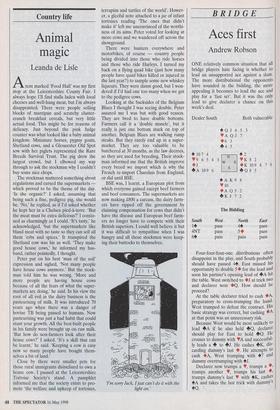Country life
Animal magic
Leanda de Lisle
The stockman muttered something about regulations and cursed the supermarkets which proved to be the theme of the day. `Is she organic?' I asked, assuming that being such a fine, pedigree pig, she would be. 'No,' he replied, as if I'd asked whether he kept her in a Chelsea pied-a-terre. 'But the meat must be extra delicious?' I contin- ued as charmingly as I could. 'It's tasty,' he acknowledged, 'but the supermarkets like bland meat with no taste so they can sell all them 'erbs and spices.' It transpired the Shetland cow was his as well. 'They make good house cows,' he informed my hus- band, rather pointedly, I thought.
Peter put on his best 'man of the soil' expression and sighed, 'Not many people have house cows anymore.' But the stock- man told him he was wrong. 'More and more people are having house cows because of all the fears of what the super- markets are doing,' he said. In his view the root of all evil in the dairy business is the pasteurising of milk. It was introduced 70 years ago when there was a danger of bovine TB being passed to humans. Now pasteurising was just a bad habit that could stunt your growth. All the best-built people in his family were brought up on raw milk. `But how do non-farmers look after their house cows?' I asked. 'It's a skill that can be learnt,' he said. 'Keeping a cow is easy now so many people have bought them- selves a bit of land.'
Close by there were smaller pets for those rural immigrants disinclined to own a house cow. I paused at the Leicestershire Tortoise Society's stand. A pamphlet informed me that the society exists to pro- mote 'the welfare and upkeep of tortoises, terrapins and turtles of the world'. Howev- er, a gleeful note attached to a jar of infant tortoises reading 'The ones that didn't make it' left me unconvinced of the worthi- ness of its aims. Peter voted for looking at more cows and we wandered off across the showground.
There were hunters everywhere and motorbikes, of course — country people being divided into those who ride horses and those who ride Harleys. I turned my back on a flying quad bike (just how many people have quad bikes killed or injured in the last year?) to sample some new whiskey liqueurs. They were damn good, but I won- dered if I'd had one too many when we got to the pedigree cows.
Looking at the backsides of the Belgium Blues I thought I was seeing double. Peter assured me I was but with good reason. They are bred to have double bottoms. Farmers call it a 'double muscle', but it really is just one bottom stuck on top of another. Belgium Blues are walking rump steaks. But they rarely end up in a super- market. They are too valuable to be butchered at 30 months, as the law decrees, so they are used for breeding. Their stock- man informed me that the British improve every breed we import which is why the French re-import Charolais from England, or did until BSE.
BSE was, I learnt, a European plot from which everyone gained except beef farmers and beef consumers. The supermarkets are now making £800 a carcass, the dairy farm- ers have ripped off the government by claiming compensation for cows that didn't have the disease and European beef farm- ers no longer have to compete with their British superiors. I could well believe it but it was difficult to sympathise when I was hungry and all those stockmen were keep- ing their buttocks to themselves.
Trn sorry Jack, I just can't do it with the light on.'


























































 Previous page
Previous page